Microplastics in Humans: Understanding the Risks and How to ..
8 Min Read


It has become clear that in value-based healthcare, data is crucial if the aim is to lower healthcare costs.
To be completely transparent when it comes to costs, data needs to be used to calculate the patient's up-front costs. This transparency eventually increases competition, which in turn lowers costs.
Data is also important to better understand the patient's conditions. It enables doctors to make better choices regarding treatments and medications, which guarantees more accurate diagnoses with the use of fewer resources.
But how can FHIR help? How can it improve the healthcare system we already know?
Take a look below to learn more about this great framework that can transform the healthcare of today.
Every individual that deals with healthcare or data science, or the areas where these industries overlap, has probably heard about electronic health records, health apps, and how they can be used to exchange healthcare data.
Fast Healthcare Interoperability Resources, or FHIR, combines the best functionalities of HL7's version 2, version 3, and CDA product lines while still leveraging the most recent web standards.
It was developed by standards organization Health Level Seven International (HL7) and it describes data formats, elements, and an application programming interface needed to exchange electronic health information.
When it comes to healthcare, interoperability enables the seamless exchange of data using simple web standards. It even allows practitioners, insurance companies, and others to aggregate data from disparate systems to acquire new insights using AI and machine learning.
FHIR was designed to allow a user to query systems that have FHIR capability independent of registries. It is meant to be easy to use and fast to develop and implement.
You can find a great study regarding FHIR that reveals all of its benefits in-depth. However, in this article, let's try to focus on the capital benefits in a more brief form that can be easily digested.
FHIR can empower patients to take ownership of their care. Sharing data with patients allows them to take more control of their health. It also enables them to make better decisions regarding their medical care.
This can range from diet and exercise to treatment and mitigation.
The bottom line is that the more data they have access to, the better they get when it comes to decision-making.
The whole industry is slowly turning to a value-based reimbursement model that revolves around data sharing.
Data sharing between payers and providers is vital in this situation. The value is better coordination of care, prevention, and better management of conditions. On top of that, there is the benefit of capping costs at the same time.
The data that makes the healthcare system is displayed in various formats. It comes from many different sources that have varying volumes and frequencies.
The way FHIR helps with the management of all this data is that it provides users with a standard common target data format. This is how the data is being transformed into a usable form. This common format ensures data accuracy, integrity, and consistency.
Data science is a field that deals with the ways data is automatically mined for insights. This is how FHIR meets the promise of AI and machine learning. There are benefits you could never think of hidden in the data that can be revealed with a framework such as this one.
Take a look at some examples of the value that could be uncovered thanks to FHIR;
These examples show how AI can change healthcare for the better. As it was mentioned, FHIR not only provides standards for the APIs and data but also tells you how this data fits together consistently.
The concept of interoperability and its importance is not too difficult to understand. Better healthcare depends on better communication. That is why it is important to improve how information is shared across organizational boundaries.
Improving interoperability means that people will get to collaborate more and use data in new ways. That is the way to improve the healthcare system.
Interoperability, in this case, refers to the seamless and secure exchange of electronic health information between users.
Health professionals and patients communicate directly. Pharmacists read doctor's handwritten prescriptions.
However, the majority of communication in health and medicine depends on information exchange architectures, application interfaces, and data standards.
These modern systems are developed on different, often inconsistent systems, making the exchange of information slow or impossible in some cases.
But the biggest problem we face today is the fact that information can't be shared easily. And that is why we need interoperability between systems.
Health data exchange architectures, app interfaces, and standards enable digitized healthcare records to be accessed and shared across the complete spectrum of care.
Unfortunately, there are quite a few challenges that interoperability is facing in the healthcare industry;
It is more than clear that FHIR can improve the healthcare system. However, this initiative has to be further developed and overcome the obstacles it faces.
But FHIR is promising. Hopefully, it will soon bring the breakthrough in healthcare we have been waiting to see for so long.